#correismo
Explore tagged Tumblr posts
Link
Segunda parte de la entrevista a la consultora Natali Becerra, en la que se analiza el desarrollo de la campaña electoral ecuatoriana y hacemos zoom a lo ocurrido durante la segunda vuelta. Realizamos un balance de lo que puede pasar el próximo domingo y lo que podría ser el futuro inmediato de ese país en los próximos 18 meses. Además, nos lanzamos unas cápsulas del retiro de la candidatura de Henrique Capriles en Venezuela y la dramática situación en Israel.
#acdc#anticorreismo#capriles#comicios#correismo#daniel#ecuador#elecciones#estrategia#gonzalez#israel#luisa#noboa#poder#politica#powertrip#segunda#tactica#topic#vuelta
0 notes
Text
POSTDEBATE:
CORREISMO CRECE CON VOTO NULO
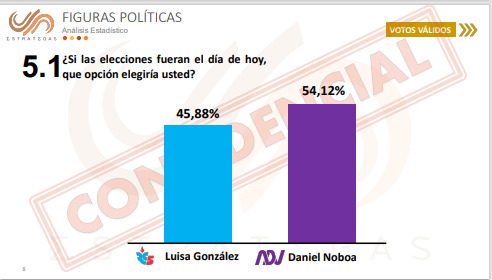
Según estudio de empresa autorizada "Estrategas", la candidata del prófugo no incrementó el porcentaje de votos a favor después del debate: el alza en válidos se da por obra y gracia del aumento de nulos e indecisos. Daniel Noboa a 10 días de las elecciones sigue en la punta con más del 54% de preferencia, 8% más que la postulante manejada desde Bélgica.
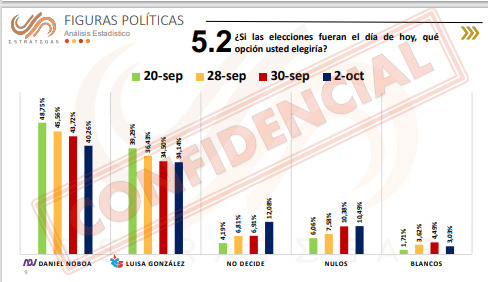
Pablo Albán Rodas, 5 de octubre de 2023
En los votos reales (es decir los que se reciben sin descontar los votos nulos y blancos) se ve un decrecimiento porcentual de las dos candidaturas entre los períodos de medición, desde el 20 de septiembre a 2 de octubre. La disminución en la medición post debate también afecta a la candidata del prófugo, en casi medio punto, con respecto al registro anterior, es decir, el debate, de acuerdo a este estudio no incrementó el voto directo del correísmo.
Lo que sí es evidente en el gráfico que los únicos votos que se han ido incrementado son los Nulos o Blancos y el porcentaje de Indecisos. Este último entre el período previo al debate y luego del mismo se incremento de 7% a más de 12%. Los nulos se mantienen y los blancos se reducen en mas de un punto. Aunque si se toma en cuenta el inicio del estudio los indecisos suben del 4 al 11% y los nulos y blancos de 7,8 a 13,5%.
Este comportamiento de los votos no válidos es parte de la estrategia maquinada desde Bélgica: la campaña sucia apunta al voto nulo y esto, por artificio matemático -algo que maneja el prófugo muy bien-, resulta en aumento del porcentaje de votos válidos de la postulante que él designó.
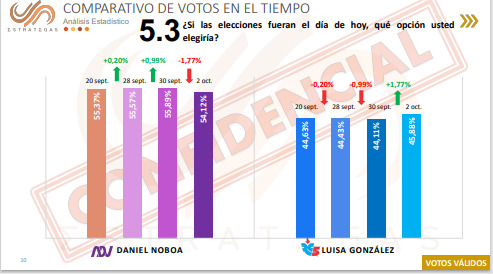
Por ello, el mejor registro lo obtiene el 2 de septiembre (45,88%) cuando los indecisos, nulos y blancos llegaban al 25%. Para el inicio del período en estudio este porcentaje se ubicaba en algo más de 12 puntos.
Dos conclusiones importantes de este estudio: 1) la candidata del prófugo no aumentó el porcentaje de votación después del debate. 2) El aumento del voto nulo, blanco y la indecisión incrementa los votos a favor de la impunidad correísta.
Sin embargo, históricamente los votos no válidos se ubican en un rango menor al que registra este estudio en la última medición. Esto pone un techo a la estrategia correísta que en base a la impostura y la mentira se sostiene.
Impostura porque el debate fue un montaje donde se proyectó lo imposible: la candidata del prófugo resulta que terminó en la segunda vuelta y en el debate por propios méritos. O sea, en un tris, se deshizo de una experiencia política nefasta para la mayoría de ecuatorianos, que dura más de 15 años y que esa misma mayoría ya quieren que termine.
Hay una verdad tras el cinismo de esa corriente política que ofrece el oro y el moro: el horizonte alcanza hasta el día en que vuelva el prófugo. ¡Y que viva la impunidad! Para el Ecuador esta no es una agenda ocula.
Por ello Noboa continúa como favorito, segun los datos de este estudio que cumple la norma, Daniel Noboa alcanza más del 54% luego del debate. La tienda del prófugo está 8 puntos por debajo.
0 notes
Text
Para mi es una típica operación/conspiración CIA para golpear al correismo, bloqueando su posibilidad de ganar las elecciones, facilitando el triunfo de la ultraderecha.
Hugo Cabieses, Lima, 10 de agosto 2023
https://www.bbc.com/mundo/articles/cx90zj5lyejo
QUIÉN ERA FERNANDO VILLAVICENCIO, EL CANDIDATO ASESINADO EN ECUADOR.
0 notes
Video
youtube
Lasso acorralado ante la probable alianza entre el correismo y el movimiento indígena en el Ecuador
0 notes
Photo
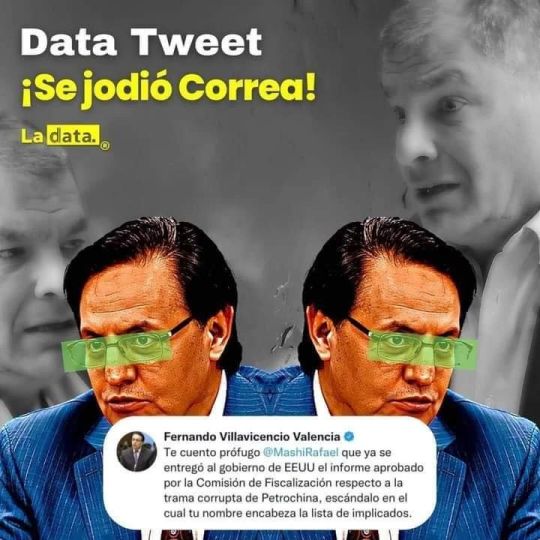
#FernandoVillavicencio Cuando les pare bola #Interpol les #Creo, mientras lo que si es real, que la Cantimplora #Villavicencio, €XT0RCION0 a Empresarios Petroleros que pronto le sacaran con pruebas su C0RRUPC¡0N! & responderán, de donde hizo su fortuna? Ya que el #Correismo le hizo pagar sus INJURIAS con la única casa que el dijo tenia, & ahora tiene la Catedral & la Capillata. Si va un año en el poder como Asambleista, como lo hizo?....🤔 Autor: #EbiCamacho (en MACHALA Capital Bananera del Mundo.EL ORO ECUADOR) https://www.instagram.com/p/CjQ-0alug4H/?igshid=NGJjMDIxMWI=
1 note
·
View note
Text
Correísmo podría volver a la presidencia de Ecuador - Latinoamérica - Internacional
Correísmo podría volver a la presidencia de Ecuador – Latinoamérica – Internacional
Mientras el líder indígena Yaku Pérez y el candidato de derecha Guillermo Lasso, en medio de un virtual empate técnico, se disputan los votos para entrar a la segunda vuelta presidencial, Andrés Arauz, ya erigido como ganador de la votación del pasado 7 de febrero, espera a su contenedor. Arauz, calificado como el delfín del expresidente Rafael Correa, logró un 32.7 por ciento de los 13 millones…

View On WordPress
1 note
·
View note
Photo

Una nueva reforma laboral en la era de la automatización Desde el año 2014, en el cual Guillermo Lasso le ponía más vigor a su gira por el Ecuador para así posicionarse mejor para las elecciones presidenciales del 2017, recuerdo haber visto y escuchado, de forma muy bien orquestada, la petición de una nueva reforma laboral para las contrataciones de empleados y sus beneficios, pero...
#ecuador#gobierno#asamblea nacional del ecuador#cámara de comercio de guayaquil#club de la unión de guayaquil#derechos del trabajador#el trabajo en el tiempo del correismo#oligarquía#propuestas a la reforma laboral#reforma al código laboral#trabajo#una nueva reforma laboral
0 notes
Text
El candidato Andrés Arauz en la mira de grupos de ultra derecha de EEUU
El candidato Andrés Arauz en la mira de grupos de ultra derecha de EEUU
El plan tiene el visto bueno del exsecretario de Estado, el tristemente célebre Mike Pompeo, quien dejó lista su instrumentación antes de salir del cargo. El próximo 7 de febrero del año en curso, se celebraran elecciones presidenciales en Ecuador, cuyos candidatos por el Correismo, serán el economista Andrés Arauz y el comunicador Carlos Rabascall, como candidatos a la presidencia y…

View On WordPress
2 notes
·
View notes
Text
Elecciones en Ecuador: el retorno del correísmo y un duro golpe para Guillermo Lasso - Descifrando la Guerra
Elecciones en Ecuador: el retorno del correísmo y un duro golpe para Guillermo Lasso – Descifrando la Guerra — Leer en www.descifrandolaguerra.es/elecciones-en-ecuador-el-retorno-del-correismo-y-un-duro-golpe-para-guillermo-lasso/
View On WordPress
0 notes
Link
Hace poco Ecuador fue noticia a nivel mundial por un hecho lamentable: el candidato presidencial Fernando Villavicencio fue asesinado. Un hecho que produjo un quiebre emocional, pero con el que no hay que confundirse: este sicariato es precedido por muchos eventos que han construido distintas capas de crisis sedimentadas una sobre otra, desde hace ya varios años. La situación es compleja y esta semana los ecuatorianos deciden su destino político en una segunda vuelta. De todo eso y un poco más, conversamos con Natali Becerra, ecuatoriana, consultora y estratega de comunicación política, quien ha sido no solo testigo de excepción, sino alguien que ha estado activamente en la primera fila de los acontecimientos.
#becerra#campañas#candidatos#carteles#correa#correismo#crisis#ecuador#emocion#estrategia#fernando#natali#poder#politica#quiebre#reputacion#sicariato#sondeos#villavicencio#violencia
0 notes
Text
DANIEL NOBOA, FIRME EN EL PRIMER LUGAR
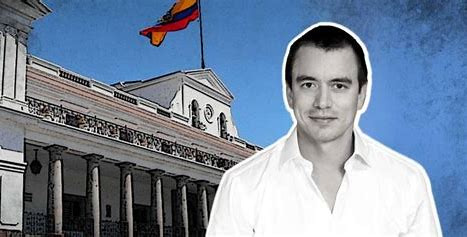
Pablo Albán Rodas, 30 de septiembre de 2023
Según las últimas encuestas el candidato de Alianza Democrática Nacional registra 56% de intención de voto, con lo que la ventaja sobre la otra opción se amplía a 12 puntos. La campaña de Daniel Noboa da números positivos a pesar del embate de la campaña sucia. En territorio promovió su programa de vivienda social e impulso a la construcción. También presentó el plan de seguridad “Fénix”.
Desde su paso a segunda vuelta, Noboa se apegó a su anunciado libreto: hacer más y mejor lo que hicimos bien en la primera, sin caer en las provocaciones de la campaña sucia. Con esa perspectiva sigue posicionando su programa de seguridad y empleo, y el compromiso de fortalecer los derechos sociales reconocidos en la Constitución y tratados internacionales, como salud y educación públicas.
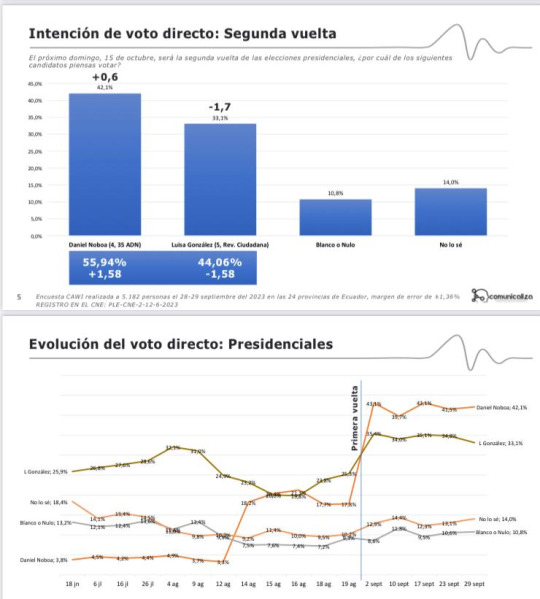
EL CORREISMO SE AGOTA
Unos cinco días estuvo la candidata del correísmo en México: una tercera parte del tiempo que resta de campaña electoral. Todo quedó en espera: visitas a territorios, a medios, a colectivos. Es que el prófugo quería asegurarse que su nominada se aprenda bien el libreto con miras al debate del domingo 1 de octubre. Allí la tienda política se juega la última carta.
Pero ¿cuál será esa carta? Repasemos: en los prolegómenos impulsaron la campaña con “los borregos”. El objetivo era agrupar al núcleo militante de la RC y fortalecer la estructura. En el primer cálculo les alcanzaría con ampliar el electorado un 5% o algo más al voto duro, confiar en la atomización de la oposición y entrar en una sola vuelta. Por ello el apego antes del 20 de agosto a aquello de “ya lo hicimos antes” y a la fusión de la imagen de la candidata con el líder requerido por la justicia ecuatoriana. Pero fueron derrotados en esta intentona.
El asesinato de un presidenciable fue un elemento decisivo en la primera vuelta. A renglón seguido se dio el debate: otro hito que, en cambio, catapultó a Daniel Noboa.
El escenario solo se clarificó horas antes de ser proclamados los resultados. El correísmo la vio cuesta arriba ante el candidato de ADN. La recomendación a esa tienda de parte de todos los expertos fue: la candidata debe mostrarse sin el hálito de Bélgica, pues la resistencia al prófugo unifica a la gran mayoría del país.
La recomendación es un imposible. La identidad y la funcionalidad de la RC descansa en el interés del líder. Las lealtades, los afectos, los protagonismos, los programas giran en torno a este personaje; alguien que, por lo demás, tiene que coexistir con su propia arrogancia y se niega a reconocer el paso del tiempo y los hechos.
La intromisión belga es intensa, sobre todo, en la campaña sucia, aupando mentiras y difamaciones. Los cuentos esbozan una inexistente agenda oculta de Noboa, que siempre le lleva a los actores de la vieja política. La galería en la que tiene un lugar prominente el mentado prófugo. El mismo que pocos días antes de la primera vuelta, cayendo en el propio engaño, adelantó la agenda del gobierno de la candidata que él mismo nominó: Anulación de los procesos penales en contra de él, convocatoria a una Asamblea Constituyente, regreso a la elección indefinida, destitución de la fiscal general del Estado.
Agenda que ni de lejos está entre la fraseología que difunde la candidata formal. Y para agitar la confusión general ante la propuesta de este partido hace pocos días adelantó que, de ganar, el prófugo sería su asesor en los temas que ella estime conveniente. ¿Qué mismo?
Una inquietud queda: ¿cuál fue la lección que le dictaron desde Bélgica? La pregunta es sesuda pues la campaña sucia, los temas del programa de la candidata casi calcados de la propuesta de Noboa y que ayer nomás rechazaron, la empatía impostada, la propuesta de unidad que nadie acepta, el inútil intento de desmarcarse de la violencia criminal, las universidades que más de una vez se negaron a abrir, el frustrado cambio de la matriz energética por obra de la corrupción, la agenda que no se puede esconder y que otorgaría impunidad al prófugo, el alineamiento con el fracaso venezolano, la tirria a la dolarización, el desprecio al banano como fruto emblemático del Ecuador, el desfalco al Seguro Social, la falta de libertades, la intención de perennizarse en el poder... En fin. El menú del correísmo se agota.
0 notes
Text
0 notes
Photo

La CUT una "Central Sindical" creada por el Correismo para ser lame botas de ese gobierno y de los demás gobiernos de turno ahora son sirvientes del Gobieno de Lasso vendiendo el derecho de los trabajadores por beneficios personales. Los trabajadores rechazamos este comunicado de la CUT que respalda al Ministro de trabajo Patricio Donoso porque la CUT no representa a los trabajadores. Las acciones de nuestra central UGTE/FUT si representa las verdaderas aspiraciones de los trabajadores es por eso que respaldamos sus acciones y repudiamos lo dicho por este mal llamado Dirigente Richard Gomez. PorB Jorge Salinas (en MACHALA Capital Bananera del Mundo.EL ORO ECUADOR) https://www.instagram.com/p/CaQUtV5PsjS/?utm_medium=tumblr
0 notes
Link
Ecuador and Peru signal political divides that could trouble the region South American politics are frequently interconnected, sometimes with shared political trends. Across the region, political and economic reforms are urgently needed due to the dramatic economic impact of the pandemic — which has disproportionally affected informal and low-income workers who have seen their sources of income all but disappear in the last year. But Peru’s and Ecuador’s presidential votes this weekend suggest that the road towards a national consensus in either nation is still long and complicated. Peru’s landscape appears split after the first round of voting. Preliminary election results indicate that voters favored candidates on the far ends of the political spectrum, including union leader Pedro Castillo, whose electoral program calls for an embrace of Marxist economic theory, and the security-focused right-winger Keiko Fujimori — the daughter of disgraced former Peruvian leader Alberto Fujimori. The two will square off in June for a second round, though the race could be complicated by the fact that Fujimori is also facing charges of corruption. Ecuador took a turn to the right, electing a multimillionaire conservative — former banker Guillermo Lasso — after almost fourteen years of left-wing rule in the country. But his victory was also the result of another clash of extreme candidates, after facing off against hard-left economist Andres Arauz. Lasso who had previously run in 2013 and 2017 but fell short, won this time only by 5 points, a sign of how divided the electorate was. He had promised to run a free-market, pro-investment government, which is expected to bring Ecuador closer to US interests in the region. His rival Arauz, in contrast, had promised a hike on taxes and a dispute with the IMF over a September loan to the country. Lasso was quick to say that his government intends to repay the loan in full and within four years. In both elections, what was mostly absent was a central figure who could win voters across the political spectrum, something that is not new in South America, a region notorious for colorful, firebrand candidates. In other nations, the pandemic has highlighted the need for a national consensus, agreements between political forces who decide to implement measures needed to put the virus under control. One such example is Italy, where a “national unity government” has formed under the leadership of prime minister Mario Draghi and supported by almost every political force in the nation. In the US, the Biden administration has also expressed the need to work across the aisle to steer the nation in the face of the pandemic. But a push toward unity now looks unlikely in Ecuador or Peru, a trend which could also emerge regionally. In Colombia and Brazil, where elections loom, the political center has also failed to rally around a convincing candidate. A warning to other leftist candidates in South America While Peru’s preliminary results have put a left-wing candidate in the pole position, Lasso’s victory in Ecuador does not look good for South America’s traditional left. The losing candidate Arauz ran his campaign under the shadow of former president Rafael Correa, who ruled the country from 2007 to 2017 on a leftist, populist platform. The support of the former leftist leader gave Arauz a strong base — he led the first round of the elections with 31.5% 32% of the vote — but also meant only a few undecided voters turned out for him in the second round. “This election was yet another referendum on Correa and a reflection of his polarizing legacy,” said John Polga-Heicemovich, a professor of comparative politics at the US Naval Academy who writes extensively on Ecuador. “Many Lasso voters seem to have celebrated the defeat of correismo more than the victory of their candidate. The fact that Arauz placed third in five provinces–behind Lasso and the null vote–also reflects Correa’s divided legacy among the ideological left and poor record with the indigenous and the environment,” he said. Arauz’s shortcoming is a warning to other South American left-leaning candidates who may try to replicate the success of the left-leaning “Pink Tide” leaders who were in power during the commodity boom of the early 2000s. That generation of leftist leaders oversaw a temporary boost to consumption due to expanded public investment but fell short of ending South America’s chronic inequality or creating structural reforms. A series of corruption scandals in many countries in the region over the past decade have also tarnished the legacy of that period. The gridlock to come Overall, the political landscape remains a jumble across the region, and divided politics and recent history indicate that governability will be a challenge in both Ecuador and Peru in the next few years. Future leaders of both countries may struggle to pass legislation through their respective Congresses, at a time when the Covid-19 pandemic is reaching a new peak. Lasso’s party, CREO, commands a small number of seats in Ecuador’s Congress, where Arauz’s party will be the biggest force. And in Peru, preliminary results suggest the new Congress will have up to 11 parliamentary groups — none commanding a majority. “The parties remain fragile,” Denisse Rodriguez-Olivari, a Peruvian political scientist at Humboldt University in Berlin, Germany, had told CNN even before the vote took place. “They are born, they grow during one election and then they die, so they are quite ephemeral.” The threat of political gridlock could not come at a worse time for either country. Both are lagging behind in their vaccination campaigns. At current rates, it would take years before Peru and Ecuador reach herd immunity. With 170.9 deaths per 100,000 inhabitants, Peru has the worst coronavirus death rate in Latin America, according to Johns Hopkins University data, while Ecuador has the sixth highest ratio of Covid-19 deaths to cases in the world. Their economies are in similar need of intensive care. According to the IMF, Peru’s economy suffered the most among major countries in Latin America and the Caribbean, shrinking 12% in 2020 due to the impact of the pandemic on global markets which purchase Peru’s raw material, and the tough lockdown policies imposed by the government to try to reduce the spread of the virus. Ecuador’s loan request to the IMF last year, meanwhile, is a testament to the country’s recent shortfalls in foreign income. Other political parties in the region could learn a lesson from the results in Ecuador and Peru: a victory for Arauz, for example, would have been a boost for politicians like Luis Ignacio Lula da Silva, who’s tipped to run again for President of Brazil in 2022. The complicated scenarios that these results anticipate are also a warning for Colombia, which is also heading for elections next year and where the political scene is deeply polarized as when economic woes sharpen the need for ambitious reforms. “Even as the Covid-19 pandemic ravages the region, there is an urgent need to consider structural reforms that will put Latin America on a long-term path of economic growth and upward social mobility,” said Gonzalo Schwarz, General Manager of the Center for Latin America at Atlas Network, a liberal think tank in Washington, DC. “Only with a dual agenda of reforms can the region break its current cycle of economic stagnation and inequality.” Source link Orbem News #Divides #Ecuador #Peru #Political #Region #Signal #trouble
0 notes
Link
0 notes
Photo

Ecuador to vote amid economic crisis and widespread discontent
Ecuador to vote amid economic crisis and widespread discontent

Quito, Ecuador – Ecuadorians will head to the polls on Sunday to elect a new president amid widespread discontent over the country’s handling of the coronavirus pandemic, an economic crisis worsened by COVID-19, and several corruption scandals.
Sixteen presidential candidates will be on the ballot, though most have polled under two percent support and are not expected to be major contenders on voting day.
The race is shaping up to be a fight between ex-banker and longtime presidential hopeful Guillermo Lasso, and Andres Arauz, an economist and former head of the central bank, who are leading in most recent polls with around 25 to 30 percent support.
Lasso, with the right-wing Creating Opportunities (CREO) party, has pledged to create jobs through more international investments and oil extraction projects, while Arauz of the Democratic Center party has promised to return to the socialist policies of former President Rafael Correa.
Third in recent polls, at about 10 to 15 percentage points behind the pair, is Yaku Perez of Pachakutik, the party of the country’s Indigenous movement, who is known for his opposition to mining and support for greater environmental protections.
Experts say it is unlikely that anyone will get the 40 percent support and at least a 10-point lead over their opponents that is needed to win the presidency, which means a runoff will be held on April 11 between the top two candidates.
The elections will be monitored by more than 2,500 local and 225 international observers, including the Organization of American States, the European Union, and the Inter-American Union of Electoral Organizations.
Voters will also elect lawmakers to fill 137 seats in the National Assembly.
Whoever wins will need to address several pressing challenges, including widespread public discontent; more than 89 percent of Ecuadorians say the country is on the wrong track, according to a December poll by the Cedatos firm.
“Corruption has been permanent, and scandals have consistently appeared in the media,” said Decio Machado, a political analyst based in Quito, the capital. “People have a lot of distrust in politics today.”

Ecuadorean presidential candidate Yaku Perez rides his bike during his closing campaign rally in Cuenca, Ecuador, on February 4
‘Mixed feelings’
Current President Lenin Moreno, who is not up for re-election, will end his single term in office drastically unpopular. His approval rating has long been hovering around seven percent, down from 77 percent in his first months in office.
Moreno was elected in 2017 as the successor to Correa, who increased public spending, cut ties with the International Monetary Fund (IMF) and World Bank, and endorsed regional integration with other socialist countries in Latin America.
But shortly after he was elected, Moreno changed course and pursued more business-friendly policies, such as cutting taxes for international mining investors and securing loans from the IMF and World Bank to fund the country’s foreign debt and fiscal deficit.

Ecuador’s former president Rafael Correa is a polarising figure today
His popularity plummeted in October of 2019 after he tried to pass IMF austerity measures that included cutting public funding and eliminating fuel subsidies that many families depend on. His effort sparked 11 days of violent protests across the country.
Dayana Leon, a political communications consultant based in Quito, said those protests polarised Ecuador, as a large part of the population did not support those demonstrating.
Leon told Al Jazeera the protests, coupled with the effects of the COVID-19 pandemic, recent corruption scandals and high unemployment, mean many Ecuadorians will “have mixed feelings when voting” – unsure of whether to vote for their preferred candidate or to vote strategically to prevent an undesired outcome.
COVID-19, economic woes
The country has been badly hit by the coronavirus, with hospitals at maximum capacity in Quito and the coastal city of Guayaquil, where healthcare and mortuary services collapsed in April.
Ecuador has reported more than 10,000 coronavirus-related deaths, according to government figures, but experts warn the actual number is likely much higher due to Ecuador’s low rates of testing for COVID-19. It has also recorded more than 251,000 infections.
Corruption scandals have also erupted during the pandemic, as at least nine public hospitals are being investigated for embezzlement.

A healthcare worker receives a dose of the Pfizer-BioNTech COVID-19 vaccine at the military hospital FFAA, in Quito
A network of public officials was recently found selling disability cards – which provide benefits to people with physical disabilities – for inflated prices or using them to import goods with tax exemptions, while Health Minister Juan Carlos Zevallos is also under scrutiny for giving one of Ecuador’s few COVID-19 vaccine doses to his mother.
Meanwhile, unemployment hit 6.6 percent in September, almost double what it was in December 2019, while poverty levels have increased from 43 to 48.5 percent, according to UNICEF Ecuador. The group also estimates that six out of every 10 households with children are now in extreme poverty without access to education, healthcare, food, jobs or social security.
“With the impact of the pandemic, the situation has worsened notably,” said the analyst, Machado. “The political debate is centred around the economy.”
‘Correismo vs anti-Correismo’
The top presidential candidates have vowed to tackle the economic crisis facing many families.
Arauz, 35, who was director of Ecuador’s central bank under Correa, has promised to bring back economic stability by reimplementing the former president’s socialist policies.
But Correa is a polarising figure in Ecuador.
His supporters remember him for decreasing poverty and increasing spending in public infrastructure during a commodities boom, but his administration was accused of corruption – and Correa himself was charged with violating campaign finance laws, which he continues to fight from his home in Belgium.
“The main electoral debate is between Correismo and anti-Correismo,” said Machado.
Both have strong support across the country, but the current government has been “the best validator of Correa’s politics”, he said. “Many people have this feeling that the past was better; there were more jobs, better purchasing power, the economic crisis was managed in a better way.”
Political platforms
Arauz’s proposals include increasing taxes on transnational companies, reinstating public spending, strengthening the Central Bank, and refusing to comply with IMF austerity measures. He also promised to give $1,000 to one million Ecuadorian families who have suffered during the pandemic to stimulate the local economy.
For his part, Lasso, 65, has promised to crack down on corruption – a nod to Correa and the current Moreno government – and proposed an international anti-corruption commission. This is his third time running for president, including in 2017 when he lost by a narrow margin to Moreno.
Lasso has tried to position himself as distinct from the last two governments, blaming the country’s current economic crisis on the last 14 years of bad governance, said Machado.

Presidential candidate Guillermo Lasso rides on a pick-up truck during a campaign caravan, in Guayaquil, Ecuador
In his current campaign, Lasso has promised to cut taxes and create one million jobs by attracting international investment, particularly in oil and mining. He also said he supports flexible work contracts, where wages and hours can be negotiated, to allow employers to hire more workers.
Perez, 51, of Pachakutik, positions himself as part of the “Ecological Left” and is a firm critic of both established right-wing politicians and Correismo. He is also a strong advocate of transitioning into a post-extractive economy and renegotiating the country’s external debt with China and the IMF.
Critics say it is unclear how he will create jobs or a stable national economy without the extractive sector, which accounts for almost nine percent of Ecuador’s GDP.
Carlos Mazabanda, Ecuador field coordinator for environmental group Amazon Watch, said Perez’s anti-mining activism has “played an important role” in defending the environment, but there is concern about whether he could maintain that stance in office in the face of a powerful mining lobby.
But Perez is supported by the many in the Indigenous community, which numbers some 1.1 million people, and environmentalists as he is the only candidate to speak at length about environmental issues and the need to address climate change.

Ecuadorean presidential candidate Andres Arauz gestures to supporters during his closing campaign rally in Quito on February 4
Voting mandatory
Beyond that, Leon said climate change and human rights were “completely absent” from debates leading up to the vote, with some candidates even showing “total ignorance of international human rights agreements”.
Most candidates said women’s rights were important, but a discussion on reproductive rights – which have come under increasing attention after Argentina legalised abortion in December – was also noticeably missing from the campaign.
A plan to address regional migration, as hundreds of thousands of Venezuelans have sought refuge in Ecuador, also remains unclear, as most presidential candidates only spoke about the issue through a public security lens.

The Cotopaxi volcano is seen near Quito, the capital of Ecuador
Still, more than 13 million people are registered to vote – and voting is mandatory in Ecuador, with anyone who does not turn in a ballot facing a fine of 10 percent of the minimum monthly wage ($40).
People must vote in person, following public health guidelines such as wearing a mask, to prevent the potential spread of the coronavirus.
During the 2017 elections, the abstention rate reached 17 percent and Machado said if voting was not mandatory, the abstention rate this year would be “extremely high” this time around, as well. “There is a lot of disbelief felt towards the proposals of politicians in general,” he said.
Read full article: https://expatimes.com/?p=17749&feed_id=32301
0 notes